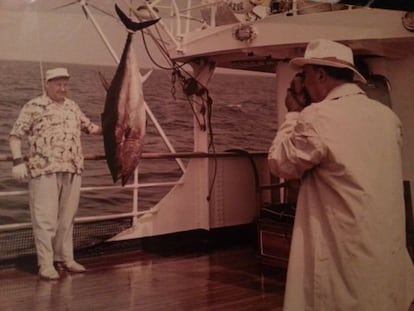Zala, General Franco’s Jewish buddy
The dictator invited the flamboyant businessman into his most intimate circle of friends He was an adventure seeker who had escaped from Nazi Germany

During his afflicted youth, there was little to indicate that Andor Zala would end up where he did. There was certainly no sign of things to come in the city where he grew up, Fiume (nowadays Rijeka, in Croatia), then a major port on the Adriatic that afforded good views of the unraveling Austro-Hungarian empire in the early 20th century; much less so in the fact that he came from a Jewish family who circumcised him eight days after his birth.
Nor were his future friendships evident from his early love of adventure and penchant for cutting class, from his ability to laugh at the world and his taste for challenging military discipline — he enlisted as a volunteer after being blown away by the visions of the soldier-poet Gabriele D’Annunzio. Nor did his tendency to fall asleep during night duty and numerous visits to the prison cell make him a likely candidate to befriend Spanish dictator Francisco Franco.
The latter’s record of service led him to a career in the Spanish army, where he so strongly identified with poorly understood national essences that he ended up becoming a renowned coup leader. Even so, Andor Zala became one of his best friends.
There must have been other factors at play. Perhaps it was Zala’s great love of the sea, his adeptness at catching tuna, his personal charm and his chutzpah that got the generalísimo himself to take a picture of Zala on the deck of the Azor, the dictator’s yacht, standing next to one of his catches. It was probably a combination of all of these elements.
He was short, stout and a glutton. Some said he was Lebanese”
It is also worth remembering that Zala was above all a wheeler-dealer who did business with — among others — the Americans. His relationship with the Hilton family was such that he convinced the patriarch, Conrad Hilton, to extend the hotel chain to Europe and to set up the very first establishment in Madrid. He was also in good standing with the shipyard tycoons and the canning industry, and could often be found flirting with major movie stars of the era such as Zsa Zsa Gabor. Zala felt at ease in a variety of circles, juggling contacts carefully from the president’s office of his import-export company.
The road that placed him on friendly terms with the hardcore elements of Franco’s dictatorship is filled with shadows. But the fact remains that General Franco — that same Franco who spent time ravaging Europe in the company of his pals Adolf Hitler and Benito Mussolini — had a Jewish friend whose bones now rest at El Pardo cemetery, next to leading members of the regime such as Luis Carrero Blanco, which proves beyond a doubt that he was part of the dictator’s closest circle.
Yolanda Prieto, a Frankfurt-based journalist who is working on a carefully crafted book about Zala, says the two met around 1935 at the Tenerife golf club. One was a young entrepreneur with boundless ambition and the other a military man who’d been semi-banished to the Canary Islands because of his sympathies for illegitimate uprisings.
Zala spoke seven languages; Franco stumbled over Castilian Spanish with his high-pitched voice, and felt inclined to destroy more than one living language (chiefly those spoken in other parts of Spain, such as Basque or Catalan).
Zala complained about the frugality of the menus on the dictator’s yacht
Andor had worked in Berlin during the turbulent 1930s, selling Fox movies. But when he saw what was coming, he thought of getting on a ship to Argentina. And he did, but the ship first made a stop in the Canary Islands, which seduced him with their fair weather and quaint atmosphere from another era. It was the kind of relaxed, tropical setting that took one’s mind off the rumbling of a convulsed Europe. He decided to stay, and soon secured safe-conducts to bring over his family members, who were spread over Fiume and Budapest, as Arcadi Espada notes in his book En nombre de Franco (In the name of Franco).
Back on the islands, Zala had landed a job with good prospects as manager of the canning factory La Rocar. From that moment on, the clues about his origins become fuzzy. He did what he had to do to get himself admitted into the regime’s exclusive, anti-Semitic circles, and soon became a regular fixture.
But there is total confusion regarding his person among Franco aides. According to Vicente Gil, the dictator’s physician, Zala was a personal friend of the general’s, as he explains in his memoirs: “He was short, stout and a glutton. Some said he was Lebanese and others asserted he was German.”
Be that as it may, Andor eventually became Andrés after obtaining Spanish citizenship in 1945. He kept up his business dealings, which were greatly facilitated by his VIP access to Franco and his ship, the Azor.
He convinced Conrad Hilton to extend his hotel chain to Europe
Besides that, the degree of trust between both men was obvious. Zala could overstep bounds that were off limits to everyone else. For instance, he would complain about the frugality of the on-board menus, especially if he had to put up with the stories that the old man liked to tell. The talk on the Azor was not about politics, but about war.
Franco was proud of his feats with a fishing rod. He once caught a giant squid that he was planning to donate to an aquarium. But when he went to show it off to some friends, the specimen had vanished: Zala had ordered it cooked. Instead of banishing him from the Azor, Franco took it like a good sport. “For once, the little fish eats the big fish,” he allegedly said.
The envy created by the pair’s closeness was such that Zala was even the target of the odd conspiracy or two. The business interests of many regime followers clearly clashed with those of Zala, and there were slander campaigns organized against him in the press. But there was no stopping him.
His later years were quiet. He died three years before his friend, in 1972. Franco reserved a spot for him at El Pardo cemetery, next to other close friends of his. Zala left this world as a Roman Catholic.
Did the dictator, who came up with notions that have gone down in the annals of absurdity such as the Judeo-Masonic Conspiracy, ever find out that one of his close friends was a clever Jew who had escaped from Nazi Germany to avoid being swallowed up by the Holocaust?








































